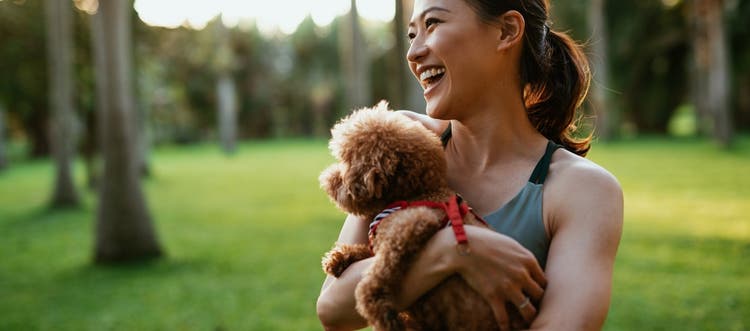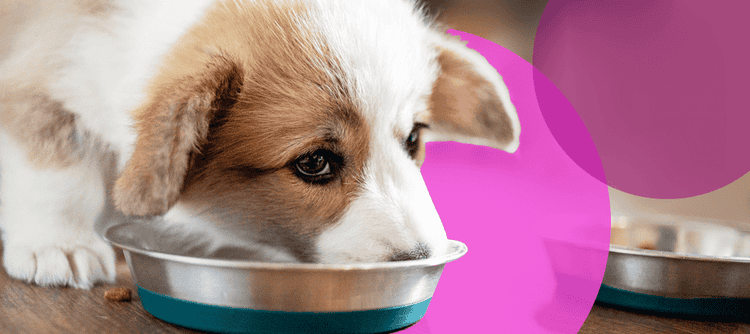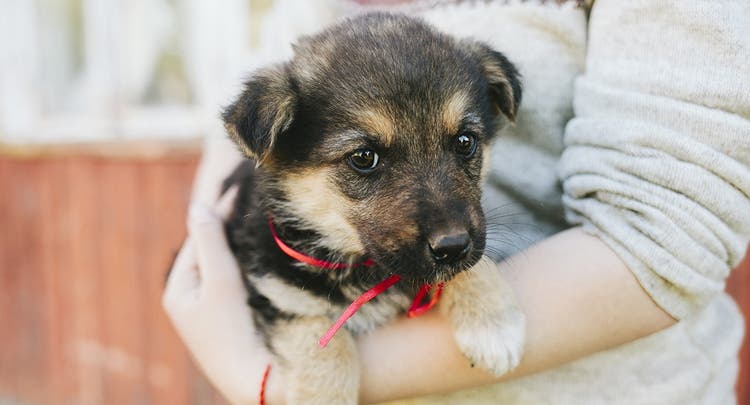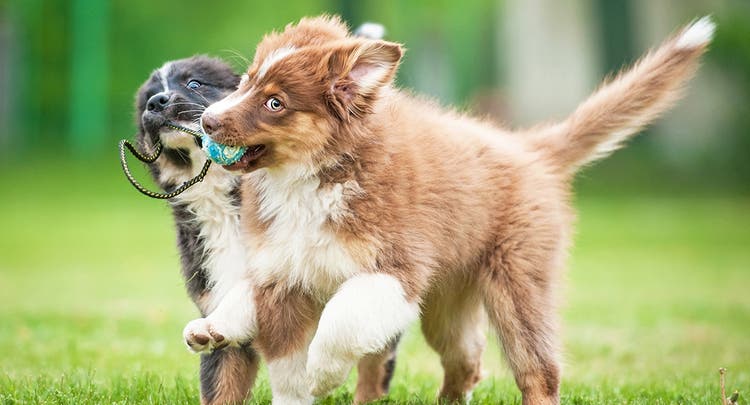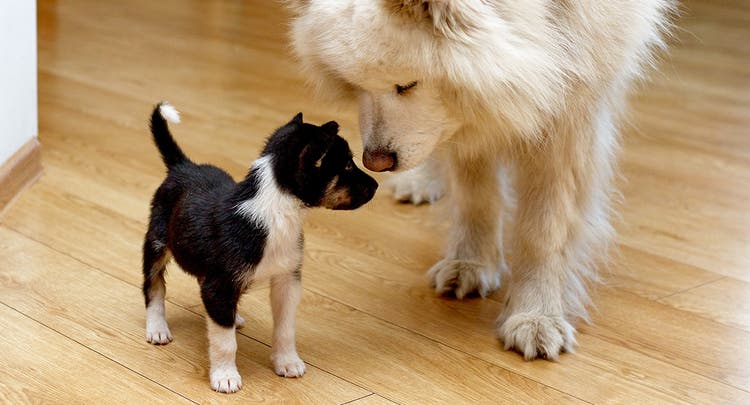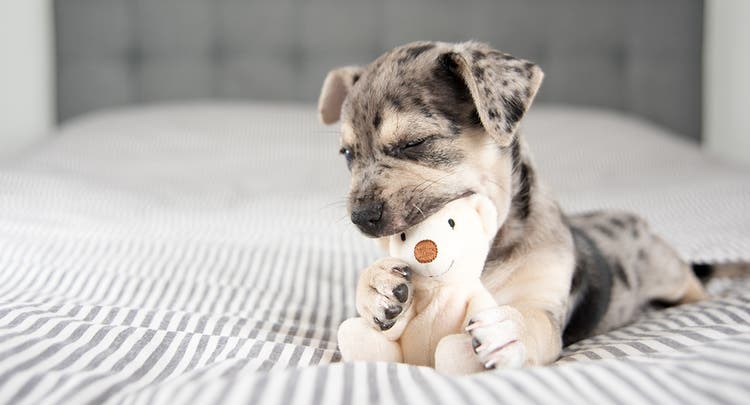Puppies undergo an amazing transformation from fetus into fully grown ball of fluff.
So you’re expecting a puppy! Whether your dog is pregnant or you’re waiting on a breeder’s litter to be born, the anticipation and excitement are mounting. Here’s what’s happening behind the scenes, what you can expect once your puppy is born, and how you can prepare for the first several months of their life.
Dog Pregnancy Week by Week: How a Puppy Fetus Develops
The gestation period for dogs is approximately nine weeks, but in that time the most incredible transformation occurs.
- Weeks 1-3: Once an egg is fertilized, a puppy fetus starts out as a cluster of only four cells! But those four cells quickly multiply to 64 cells, ready to form a head and spine.
- Week 4: The fetus grows a head, eyes and its first vertebrae. At this point, it’s nearly tripled in size and is about as big as a hazelnut.
- Weeks 5-6: The fetus is starting to look more like a puppy! Tiny toes, nails and whiskers have formed. The fetus’s organs have completely developed, along with its skin color. At the six-week mark, the fetus has sex organs and begins to develop into either a male or a female.
- Weeks 7-8: This soon-to-be-pup’s skeleton has developed completely and can be seen clearly by ultrasound. You may notice the mother has developed a bald spot on her stomach — this is so her pup can nurse more easily.
- Week 9: The wait is over! Puppies can be safely born from day 57 to the beginning of Week 9 — although they will usually wait until 60 to 63 days.
Puppy Growth Stages: From Birth to 12 Weeks
Puppies are born blind, deaf and toothless, and they can’t regulate their body temperature for the first week or two. A newborn pup depends on their mother and littermates for warmth — that’s why puppies snuggle together during these first weeks.
Week 1: Snoozing and Growing
A newborn puppy spends 90% of their time sleeping — all that eating and growing take a lot of energy! During the first 10 days of their life, their weight will double. A newborn can’t support their own weight yet, but they can crawl and wiggle around using their front legs.
Weeks 2-3: A Whole New World
In the second week of your pup’s life, their ears and eyes open, giving them a completely new sense of their environment. At this point, you’ll notice that your pup has become chattier, testing out their vocal skills with yelps, whines and barks. By week three, a newborn will take their first wobbly steps.
This is a time of rapid physical and sensory development for a puppy. They begin to play with their littermates, and their personalities start to show up more distinctly. They also start to develop bladder control, though most puppies aren’t ready to be housetrained until they’re 12-16 weeks old.
Weeks 4-11: Socializing and Learning
Puppies begin transitioning to solid food at around week 4 and develop their baby teeth at week 6. In weeks six to eight, a pup will learn to accept others as a part of the family. By the time the puppy reaches 10 weeks old, they might be a little hesitant about meeting new people.
By staying with their mother and littermates at this stage, a puppy learns useful socialization skills like bite inhibition, how to understand and react to normal canine communication, and their place in doggy society.
Week 12: Part of the Pack
If you’re expecting a pup from a breeder, the long wait is over! At week 12 a puppy is ready to leave the litter and join you in their new forever home.
When Do Puppies Stop Growing?
Your puppy’s growth rate depends on their breed and size. The larger the dog, the longer it will take for your puppy to be fully finished growing. In general, your puppy will reach their adult size by:
- Toy breeds: 6-8 months
- Small breeds: 10-12 months
- Medium breeds: 12 months
- Large breeds: 14-18 months
- Giant breeds: 24 months
Want to make sure your puppy is growing as expected? Check out our puppy growth charts, organized by breed size.
Caring for Your New Puppy: The Basics
New to puppyhood? From scheduling your first vet visit to choosing the best puppy food, these tips and guides will give you a solid head-start.
Feeding Your Puppy
Puppies need specialized nutrition to support their growth and development. Look for food specifically labeled for puppies, and make sure you’re feeding them the right amount for their breed and size.
Scheduling Your Puppy’s First Vet Visit
Your puppy should see a vet shortly after they arrive in their new home with you. Your vet will check your puppy’s weight, examine their body, heart and lungs, and answer questions you might have about bathing, trimming your pup’s nails, teething and more.
During this visit, your veterinarian will review your puppy’s vaccination schedule, and your puppy will receive several core vaccinations to protect them against potentially dangerous viruses and illnesses. For instance, your vet will administer the first in a series of vaccines for canine parvovirus (also known as parvo), a highly contagious gastrointestinal virus that can be fatal to puppies. (Because parvo is so dangerous, learning the signs of parvo in puppies can potentially help save their life.)
Finally, ask your vet about flea treatment for puppies, as well as other parasite preventives they recommend.
Housetraining Your Puppy
Puppies don’t have enough control over their bladder and bowel functions to start housetraining before they are 12-16 weeks old. Once they’re ready, follow these tips to keep training on track:
- The Humane Society of the United States recommends taking your puppy out every two hours, as well as after they wake up in the morning, or after they’ve eaten, drank or played.1
- Always take your puppy to the same spot to eliminate, and use a simple phrase like “Go!” or “Potty!” every time, so they start to associated the command with the action.
- When they go, praise them enthusiastically and give them a small treat. Feeding your puppy at regular intervals can reduce the chance of accidents and make their bathroom breaks more predictable.1
- Never punish a puppy for having an accident in the house. Instead, clean up the mess thoroughly — so the puppy won’t be tempted to eliminate in the spot again — and stay consistent in your housetraining routine. Over time, your puppy will learn where you want them to go.
With the arrival of your new pup, the two of you are embarking on a grand adventure. And by giving them the best possible start, you’re helping ensure your puppy lives a healthy, happy life.
References
- Humane Society of the United States. How to potty train your dog or puppy. https://www.humanesociety.org/resources/how-potty-train-your-dog-or-puppy
